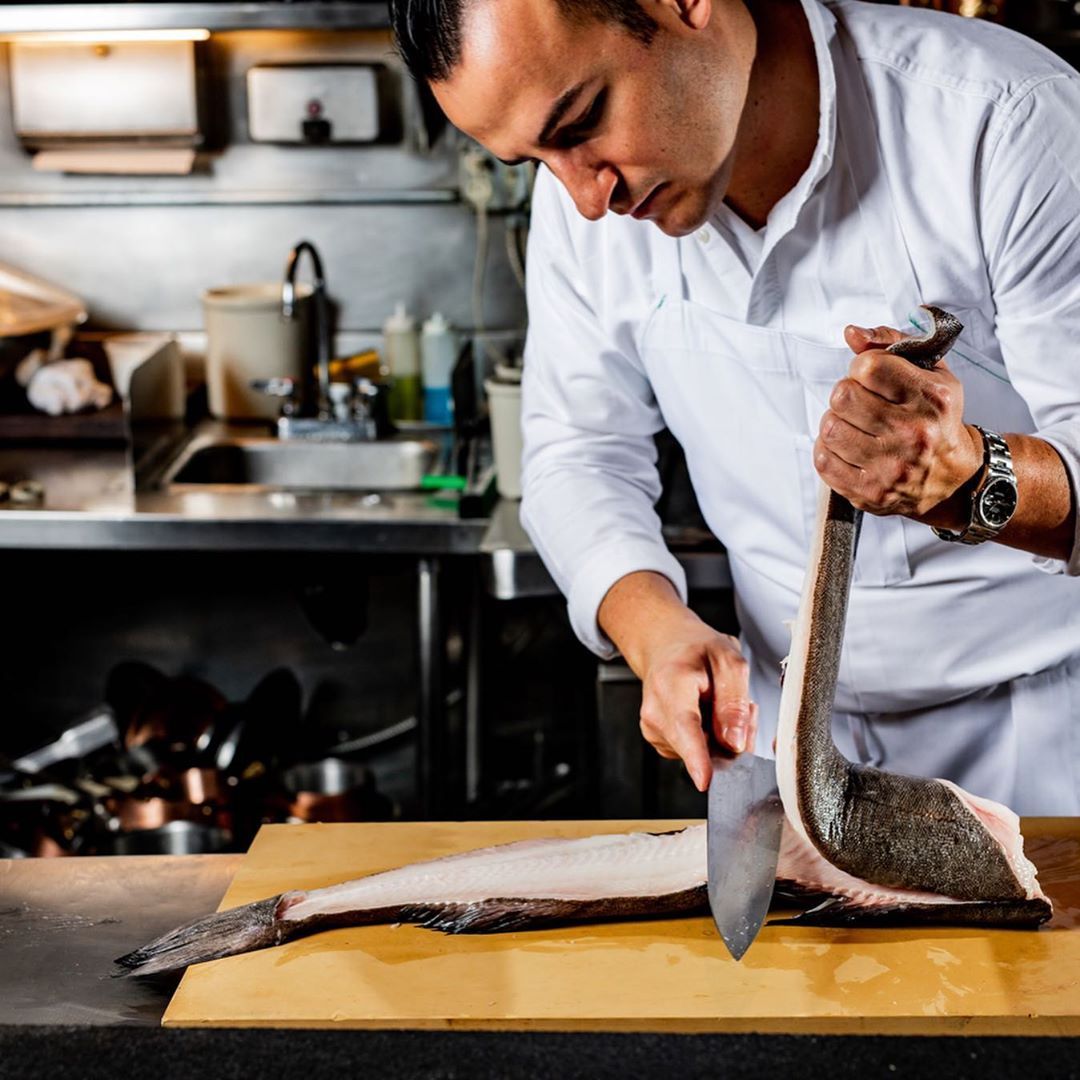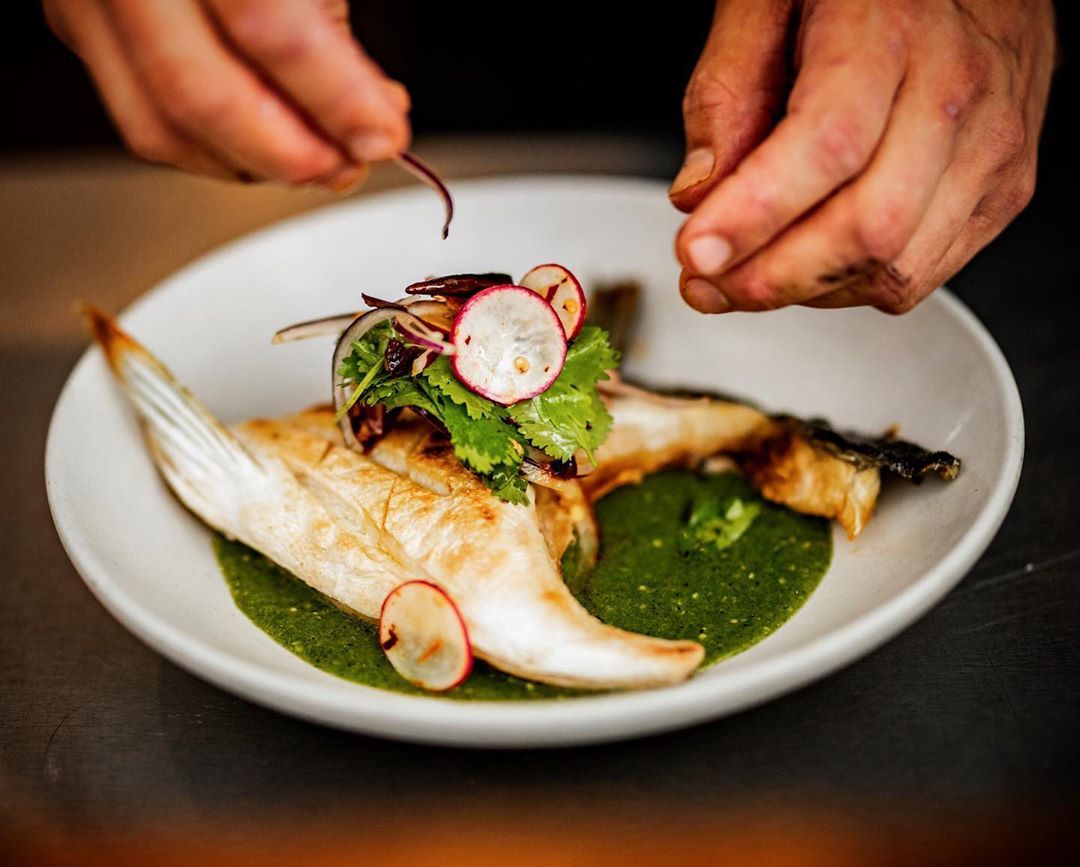Update 3/23/2020: Four Star Seafood & Provisions has started to offer their products direct-to-consumers for the first time in their history. Order online to get great fish and support local businesses in this difficult time.
Adrian Hoffman never planned to become a fishmonger. He cooked his way through high school and then college, while studying philosophy at Brandeis. Eventually, he realized that working the line was more than a side job.
Deciding to take his culinary career seriously, he shuffled around kitchens in New York, London, and Boston before landing at One Market in San Francisco, where he worked under Chef Bradley Ogden. Four years later, he was the VP and Culinary Director for the Lark Creek Group, which meant “stepping away from the kitchen, learning the business of restaurants,” Adrian says.
When he finally left Lark Creek, Adrian consulted for other businesses and even pitched a restaurant concept of his own. (“I realized what a struggle that was, raising money.”) He connected with his friend Ismael Macias, who had spent a year and a half touring the world, working at restaurants like Noma and Eleven Madison Park. Initially, they tried to open a restaurant in the Port of San Francisco, but authorities shot down the idea, so they regrouped.
“In all of our travels, we saw seafood being treated so much better than it is in the United States,” Adrian explains. “The supply chain between the fishermen and the end user is really poor in the United States. In Hong Kong, everybody’s doing their best to show you how fresh the fish is – you just can’t find that kind of thing here.”
"Our niche is chef-to-chef. We were our own customers for our entire careers before we started this."
He and Ismael saw an opportunity to change that. They bought product from fishermen in Half Moon Bay and built what he calls a “cocktail napkin business plan” with coolers full of ice, his own garage for storage, and $20,000 in the bank. Six months later, Four Star Seafood leased a small space on Pier 45, and in 2019, they moved into a 10,000-square-foot building in Bayview.
“Our niche is chef-to-chef,” says Adrian. “My partner and I had long, reasonably successful chef careers and then decided to get into this business – we were our own customers for our entire careers before we started this.”
That perspective gives Four Star an edge when working with chefs. They’ve been on the other side. Here, Adrian shares tips for restaurants on sourcing the best, freshest seafood products possible.

Demand more from distributors… When working with distributors at Lark Creek, Adrian says, “they hated me right off the bat.” He built a system in which vendors bid each other out for business, and he required that they do all the data entry work themselves. His high bar paid off: Adrian cut food costs by 2% across Lark Creek’s locations. He was reluctant to hear pitches from vendors who were offering the same product – with the same supply chain – as everyone else in the space. “I wasn’t really going to give them too much time without a compelling reason. I was pretty demanding of my vendors before, but if I ever went back to being a chef, I would be infinitely more demanding.” Look for vendors offering differentiated product, and don’t settle for anything less.
...But be patient and learn the business. The biggest challenge in the seafood business? “We sell fish that’s still swimming,” Adrian says. Maybe the fish won’t bite or will fall off the hook, or the fisherman won’t ship it out in time. “Every step along the way, there’s a lot of room for things to go wrong. Sometimes it requires a little bit of patience.” When chefs understand how Four Star works directly with fishermen (and the uncertainties inherent in the process), they can become informed partners who plan ahead, ask the right questions about seasonality and availability, and receive a better end product.
Reduce the changing of hands. When it comes to ordering seafood, a short supply chain should be top priority for restaurants. Buy fresher product that’s as close to the source as possible. “The problem with this industry is that it’s first in, first out,” explains Adrian. Four Star reduced the number of times that product changed hands by controlling every step of the process, buying directly from fishermen and flying lobster and scallops in daily from the east coast. “It wouldn’t be hard to come up with the name of the boat and the captain for a substantial amount of what we sell,” he adds.

Look for product that speaks for itself. See for yourself how fresh and high-quality a product is by asking distributors for a sample. When he and Macias first started the business, Adrian bought live sardines from Half Moon Bay and used them as a calling card, dropping samples off at about 50 restaurants in the Bay Area. (“Sardines are one of those things – when you get them perfectly fresh, you can tell the difference,” he says.) Benu’s Corey Lee called them immediately to say they were the best sardines he’d ever tasted. They did the same thing with lingcod, delivering live fish to restaurants, where they would flop around on kitchen counters. “Everybody was taking pictures and posting – that never, ever happens. It certainly made an impression.”
Request specialty items. A good distributor can help source all kinds of products, not just the ones they already offer. For example, Adrian found a company out of Maine, Rogers Collection, that imports artisanal items from around the world, including a high-moisture bottarga with a less salty, more delicate palate. He tipped off Justin Mauz, who runs the provisions side of the business, and they started sourcing more of the company’s products for restaurants like Che Fico Alimentari.
Communicate early and often. If Adrian could give one piece of advice to his former chef self, it would be this: communicate more with distributors. Treat them like partners in the business. Call when changing a menu for the season to make sure enough product will be available. Ask about quantities and flexibility and even weather forecasts, so partners on both sides will share the same expectations and stay prepared. Four Star’s sales team is always on call to help. “The more communication, the better,” says Adrian. “The more somebody is in touch with me, the more I can lead them in the right direction.”
Photos courtesy of Four Star Seafood

 Olivia Terenzio
Olivia Terenzio